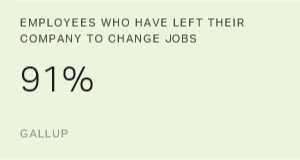Story Highlights
- Millennials' sense of purpose is alarmingly low
- Companies need to show millennials how they further the mission
- It is crucial to connect purpose to organizational identity
A sense of purpose fuels employee performance. People thrive when they wake up every morning with something to look forward to doing that day.
For millennials, this sense of purpose is alarmingly low.
Only slightly more than a third of millennial workers strongly agree that the mission or purpose of their organization makes them feel their job is important. And just 40% of millennials feel strongly connected to their company's mission, as revealed in Gallup's report, How Millennials Want to Work and Live. This is a problem leaders need to take seriously because millennials currently make up 38% of the U.S. workforce.
When it comes to instilling purpose, inspirational words on a website aren't enough. Companies need to strategically and proactively connect millennials with the big picture.
Motivational Leaders Inspire Enthusiasm for the Future
Gallup finds that most workers with a high sense of their company's purpose have leaders who motivate them and inspire enthusiasm for the future. It's clear that leaders and managers hold immense power in ensuring a company's purpose resonates with its workers.
By acting on this responsibility, leaders help employees own and embody the company's vision. With mission-driven workers, companies realize major performance gains, including increased employee loyalty and retention, greater customer engagement, improved strategic alignment and enhanced clarity about work priorities.
Rallying millennials around a mission and purpose dramatically increases their employee engagement: 67% of millennials are engaged at work when they strongly agree that the mission or purpose of their company makes them feel their job is important.
In contrast, just 14% of millennials are engaged when they strongly disagree with this statement -- meaning millennials are more than 4.5 times more likely to be engaged in their work when companies promote their purpose. Because this engagement boost comes with increased retention, fostering a connection to purpose can help leaders fight millennials' propensity for job-hopping.
But for many leaders, connecting millennials to a company mission seems like a herculean task. While a purpose-driven workforce isn't achieved overnight, it starts with a simple concept: consistent communication.
Show Millennials How They Further the Mission
Managers need to make sure employees are always aware of the company's mission, illustrating how each contributor -- and the team's collective work -- advances the organization's overarching goals. Managers can foster a focus on purpose by infusing it into everything from reports of client outcomes to ongoing employee development conversations.
Managers have their work cut out for them in this area. Only 26% of millennials say that in the past seven days, they have heard someone talk about how their daily work connects with their organization's mission and purpose. And just 34% of millennials report that they have heard a story in the past 30 days about how their company impacted a customer to improve their business or life.
On the bright side, managers can realize significant improvements with straightforward interventions, such as recognizing employees for accomplishments that further the company's purpose. Simply discussing mission and purpose on a regular basis -- keeping it top of mind -- helps millennials relate it to their work.
Connect Purpose to Organizational Identity
The most successful companies Gallup has studied use purpose to inform their culture -- including how employees interact and how work gets done. These best-in-class companies also tie purpose to their brand, differentiating themselves by delivering their purpose each day as they solve customers' problems and offer great products and services.
When a company's purpose is evident through its culture and brand, millennials are better able to connect it to their role. Leaders should strategically align the company's purpose, brand and culture to create an environment in which mission is something employees experience daily. By integrating purpose company-wide, leaders give employees the opportunity to own the company's mission and transform it into enhanced performance.
At face value, a company's mission may not seem like a potent performance driver. But by giving millennials a true purpose, leaders foster a workforce that is more productive, profitable and committed to their company.



